NSW Policy and Nursing: Preventing Obesity and Promoting Active Living
VerifiedAdded on 2023/06/09
|8
|2194
|64
Essay
AI Summary
This essay explores the critical role of nurses in obesity prevention, emphasizing the importance of health policies in shaping nursing practices. It analyzes the NSW Healthy Eating and Active Living Strategy: Preventing overweight and obesity in New South Wales 2013-2018, highlighting its objectives and the potential for nurses to educate patients on lifestyle interventions. The essay discusses how nurses can leverage the policy to identify vulnerable populations, advocate for community needs, and foster intersectoral collaboration. Ultimately, it argues that policies are instrumental in guiding nurses to provide effective care, promote healthy living, and contribute to a healthier nation. Desklib provides access to this essay and a wealth of resources for students.
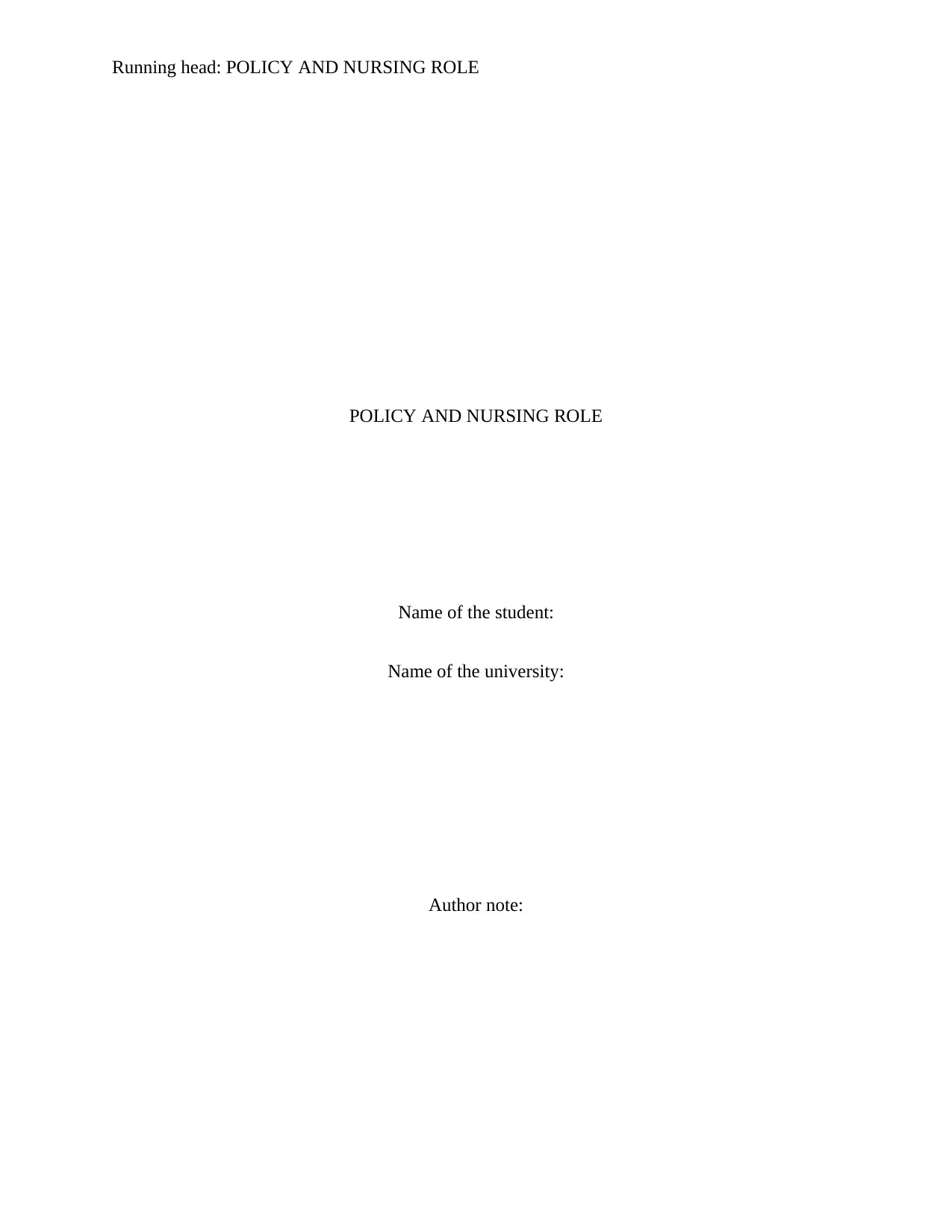
Running head: POLICY AND NURSING ROLE
POLICY AND NURSING ROLE
Name of the student:
Name of the university:
Author note:
POLICY AND NURSING ROLE
Name of the student:
Name of the university:
Author note:
Paraphrase This Document
Need a fresh take? Get an instant paraphrase of this document with our AI Paraphraser
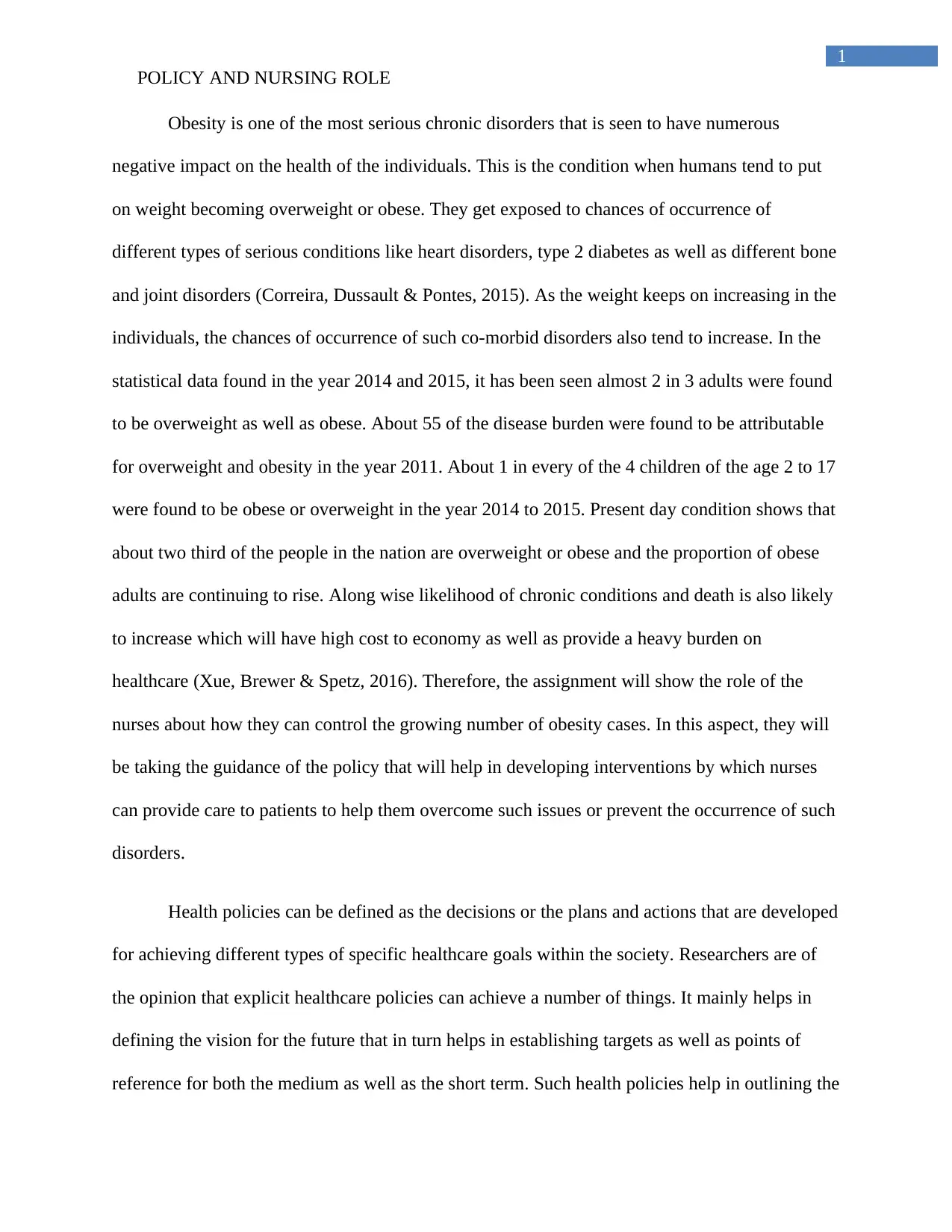
1
POLICY AND NURSING ROLE
Obesity is one of the most serious chronic disorders that is seen to have numerous
negative impact on the health of the individuals. This is the condition when humans tend to put
on weight becoming overweight or obese. They get exposed to chances of occurrence of
different types of serious conditions like heart disorders, type 2 diabetes as well as different bone
and joint disorders (Correira, Dussault & Pontes, 2015). As the weight keeps on increasing in the
individuals, the chances of occurrence of such co-morbid disorders also tend to increase. In the
statistical data found in the year 2014 and 2015, it has been seen almost 2 in 3 adults were found
to be overweight as well as obese. About 55 of the disease burden were found to be attributable
for overweight and obesity in the year 2011. About 1 in every of the 4 children of the age 2 to 17
were found to be obese or overweight in the year 2014 to 2015. Present day condition shows that
about two third of the people in the nation are overweight or obese and the proportion of obese
adults are continuing to rise. Along wise likelihood of chronic conditions and death is also likely
to increase which will have high cost to economy as well as provide a heavy burden on
healthcare (Xue, Brewer & Spetz, 2016). Therefore, the assignment will show the role of the
nurses about how they can control the growing number of obesity cases. In this aspect, they will
be taking the guidance of the policy that will help in developing interventions by which nurses
can provide care to patients to help them overcome such issues or prevent the occurrence of such
disorders.
Health policies can be defined as the decisions or the plans and actions that are developed
for achieving different types of specific healthcare goals within the society. Researchers are of
the opinion that explicit healthcare policies can achieve a number of things. It mainly helps in
defining the vision for the future that in turn helps in establishing targets as well as points of
reference for both the medium as well as the short term. Such health policies help in outlining the
POLICY AND NURSING ROLE
Obesity is one of the most serious chronic disorders that is seen to have numerous
negative impact on the health of the individuals. This is the condition when humans tend to put
on weight becoming overweight or obese. They get exposed to chances of occurrence of
different types of serious conditions like heart disorders, type 2 diabetes as well as different bone
and joint disorders (Correira, Dussault & Pontes, 2015). As the weight keeps on increasing in the
individuals, the chances of occurrence of such co-morbid disorders also tend to increase. In the
statistical data found in the year 2014 and 2015, it has been seen almost 2 in 3 adults were found
to be overweight as well as obese. About 55 of the disease burden were found to be attributable
for overweight and obesity in the year 2011. About 1 in every of the 4 children of the age 2 to 17
were found to be obese or overweight in the year 2014 to 2015. Present day condition shows that
about two third of the people in the nation are overweight or obese and the proportion of obese
adults are continuing to rise. Along wise likelihood of chronic conditions and death is also likely
to increase which will have high cost to economy as well as provide a heavy burden on
healthcare (Xue, Brewer & Spetz, 2016). Therefore, the assignment will show the role of the
nurses about how they can control the growing number of obesity cases. In this aspect, they will
be taking the guidance of the policy that will help in developing interventions by which nurses
can provide care to patients to help them overcome such issues or prevent the occurrence of such
disorders.
Health policies can be defined as the decisions or the plans and actions that are developed
for achieving different types of specific healthcare goals within the society. Researchers are of
the opinion that explicit healthcare policies can achieve a number of things. It mainly helps in
defining the vision for the future that in turn helps in establishing targets as well as points of
reference for both the medium as well as the short term. Such health policies help in outlining the
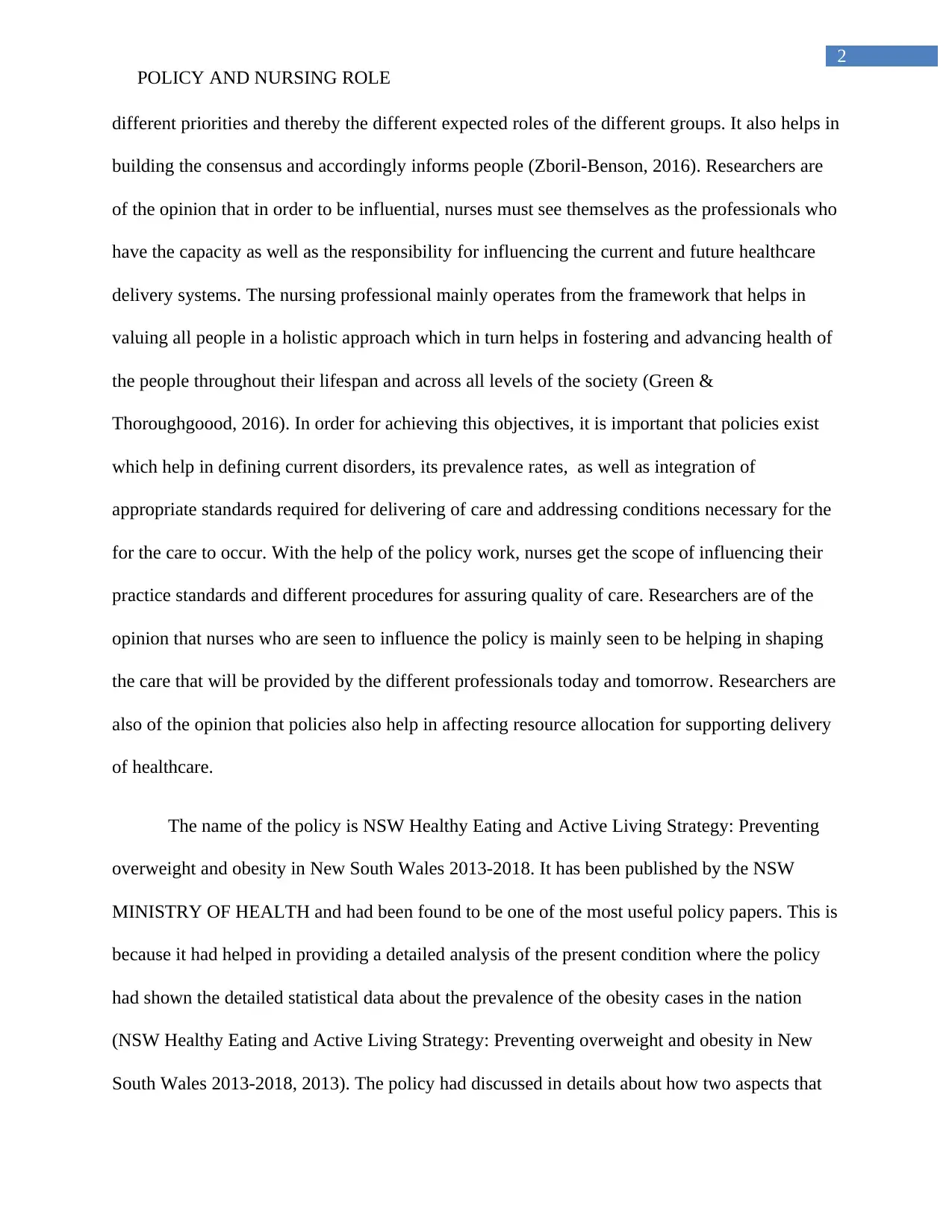
2
POLICY AND NURSING ROLE
different priorities and thereby the different expected roles of the different groups. It also helps in
building the consensus and accordingly informs people (Zboril-Benson, 2016). Researchers are
of the opinion that in order to be influential, nurses must see themselves as the professionals who
have the capacity as well as the responsibility for influencing the current and future healthcare
delivery systems. The nursing professional mainly operates from the framework that helps in
valuing all people in a holistic approach which in turn helps in fostering and advancing health of
the people throughout their lifespan and across all levels of the society (Green &
Thoroughgoood, 2016). In order for achieving this objectives, it is important that policies exist
which help in defining current disorders, its prevalence rates, as well as integration of
appropriate standards required for delivering of care and addressing conditions necessary for the
for the care to occur. With the help of the policy work, nurses get the scope of influencing their
practice standards and different procedures for assuring quality of care. Researchers are of the
opinion that nurses who are seen to influence the policy is mainly seen to be helping in shaping
the care that will be provided by the different professionals today and tomorrow. Researchers are
also of the opinion that policies also help in affecting resource allocation for supporting delivery
of healthcare.
The name of the policy is NSW Healthy Eating and Active Living Strategy: Preventing
overweight and obesity in New South Wales 2013-2018. It has been published by the NSW
MINISTRY OF HEALTH and had been found to be one of the most useful policy papers. This is
because it had helped in providing a detailed analysis of the present condition where the policy
had shown the detailed statistical data about the prevalence of the obesity cases in the nation
(NSW Healthy Eating and Active Living Strategy: Preventing overweight and obesity in New
South Wales 2013-2018, 2013). The policy had discussed in details about how two aspects that
POLICY AND NURSING ROLE
different priorities and thereby the different expected roles of the different groups. It also helps in
building the consensus and accordingly informs people (Zboril-Benson, 2016). Researchers are
of the opinion that in order to be influential, nurses must see themselves as the professionals who
have the capacity as well as the responsibility for influencing the current and future healthcare
delivery systems. The nursing professional mainly operates from the framework that helps in
valuing all people in a holistic approach which in turn helps in fostering and advancing health of
the people throughout their lifespan and across all levels of the society (Green &
Thoroughgoood, 2016). In order for achieving this objectives, it is important that policies exist
which help in defining current disorders, its prevalence rates, as well as integration of
appropriate standards required for delivering of care and addressing conditions necessary for the
for the care to occur. With the help of the policy work, nurses get the scope of influencing their
practice standards and different procedures for assuring quality of care. Researchers are of the
opinion that nurses who are seen to influence the policy is mainly seen to be helping in shaping
the care that will be provided by the different professionals today and tomorrow. Researchers are
also of the opinion that policies also help in affecting resource allocation for supporting delivery
of healthcare.
The name of the policy is NSW Healthy Eating and Active Living Strategy: Preventing
overweight and obesity in New South Wales 2013-2018. It has been published by the NSW
MINISTRY OF HEALTH and had been found to be one of the most useful policy papers. This is
because it had helped in providing a detailed analysis of the present condition where the policy
had shown the detailed statistical data about the prevalence of the obesity cases in the nation
(NSW Healthy Eating and Active Living Strategy: Preventing overweight and obesity in New
South Wales 2013-2018, 2013). The policy had discussed in details about how two aspects that
⊘ This is a preview!⊘
Do you want full access?
Subscribe today to unlock all pages.

Trusted by 1+ million students worldwide
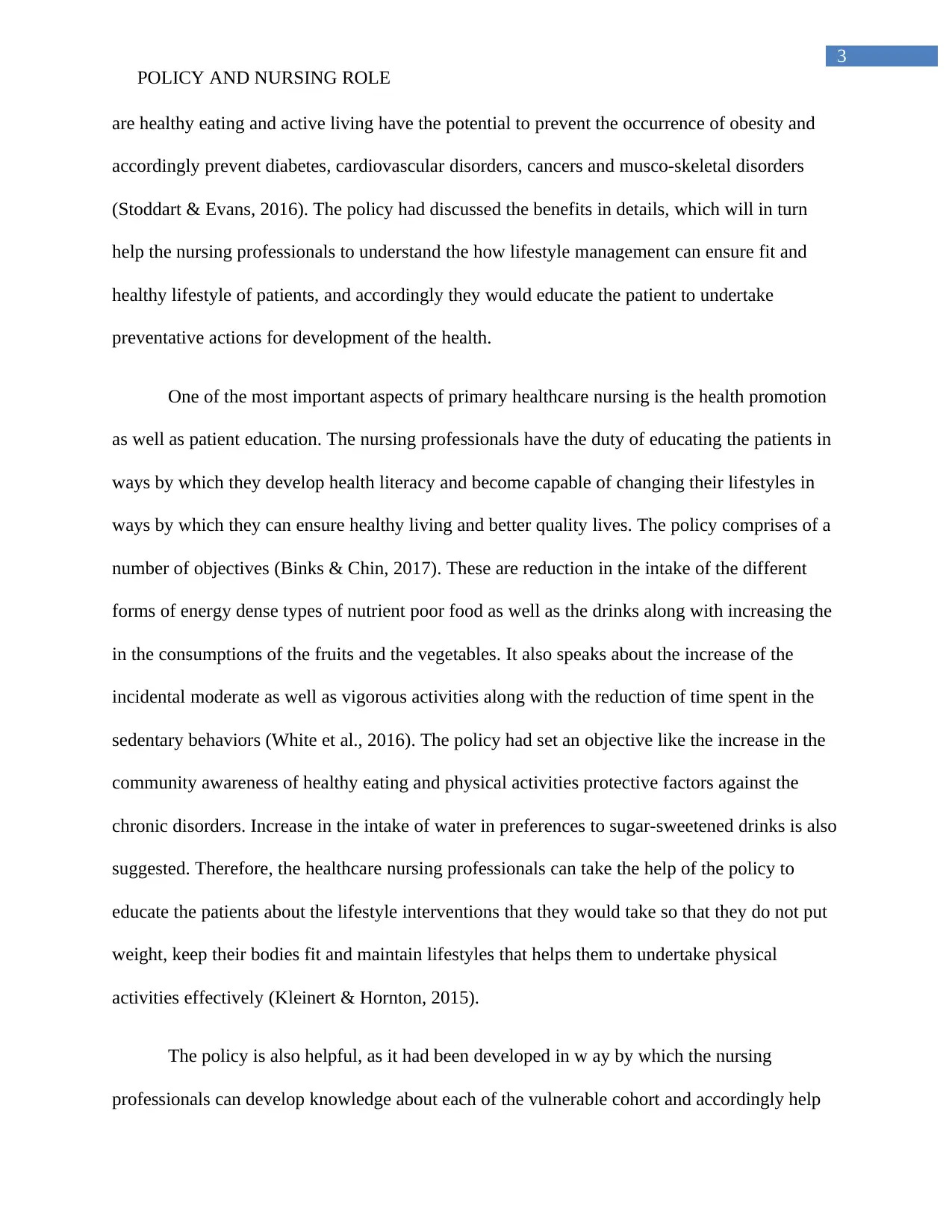
3
POLICY AND NURSING ROLE
are healthy eating and active living have the potential to prevent the occurrence of obesity and
accordingly prevent diabetes, cardiovascular disorders, cancers and musco-skeletal disorders
(Stoddart & Evans, 2016). The policy had discussed the benefits in details, which will in turn
help the nursing professionals to understand the how lifestyle management can ensure fit and
healthy lifestyle of patients, and accordingly they would educate the patient to undertake
preventative actions for development of the health.
One of the most important aspects of primary healthcare nursing is the health promotion
as well as patient education. The nursing professionals have the duty of educating the patients in
ways by which they develop health literacy and become capable of changing their lifestyles in
ways by which they can ensure healthy living and better quality lives. The policy comprises of a
number of objectives (Binks & Chin, 2017). These are reduction in the intake of the different
forms of energy dense types of nutrient poor food as well as the drinks along with increasing the
in the consumptions of the fruits and the vegetables. It also speaks about the increase of the
incidental moderate as well as vigorous activities along with the reduction of time spent in the
sedentary behaviors (White et al., 2016). The policy had set an objective like the increase in the
community awareness of healthy eating and physical activities protective factors against the
chronic disorders. Increase in the intake of water in preferences to sugar-sweetened drinks is also
suggested. Therefore, the healthcare nursing professionals can take the help of the policy to
educate the patients about the lifestyle interventions that they would take so that they do not put
weight, keep their bodies fit and maintain lifestyles that helps them to undertake physical
activities effectively (Kleinert & Hornton, 2015).
The policy is also helpful, as it had been developed in w ay by which the nursing
professionals can develop knowledge about each of the vulnerable cohort and accordingly help
POLICY AND NURSING ROLE
are healthy eating and active living have the potential to prevent the occurrence of obesity and
accordingly prevent diabetes, cardiovascular disorders, cancers and musco-skeletal disorders
(Stoddart & Evans, 2016). The policy had discussed the benefits in details, which will in turn
help the nursing professionals to understand the how lifestyle management can ensure fit and
healthy lifestyle of patients, and accordingly they would educate the patient to undertake
preventative actions for development of the health.
One of the most important aspects of primary healthcare nursing is the health promotion
as well as patient education. The nursing professionals have the duty of educating the patients in
ways by which they develop health literacy and become capable of changing their lifestyles in
ways by which they can ensure healthy living and better quality lives. The policy comprises of a
number of objectives (Binks & Chin, 2017). These are reduction in the intake of the different
forms of energy dense types of nutrient poor food as well as the drinks along with increasing the
in the consumptions of the fruits and the vegetables. It also speaks about the increase of the
incidental moderate as well as vigorous activities along with the reduction of time spent in the
sedentary behaviors (White et al., 2016). The policy had set an objective like the increase in the
community awareness of healthy eating and physical activities protective factors against the
chronic disorders. Increase in the intake of water in preferences to sugar-sweetened drinks is also
suggested. Therefore, the healthcare nursing professionals can take the help of the policy to
educate the patients about the lifestyle interventions that they would take so that they do not put
weight, keep their bodies fit and maintain lifestyles that helps them to undertake physical
activities effectively (Kleinert & Hornton, 2015).
The policy is also helpful, as it had been developed in w ay by which the nursing
professionals can develop knowledge about each of the vulnerable cohort and accordingly help
Paraphrase This Document
Need a fresh take? Get an instant paraphrase of this document with our AI Paraphraser
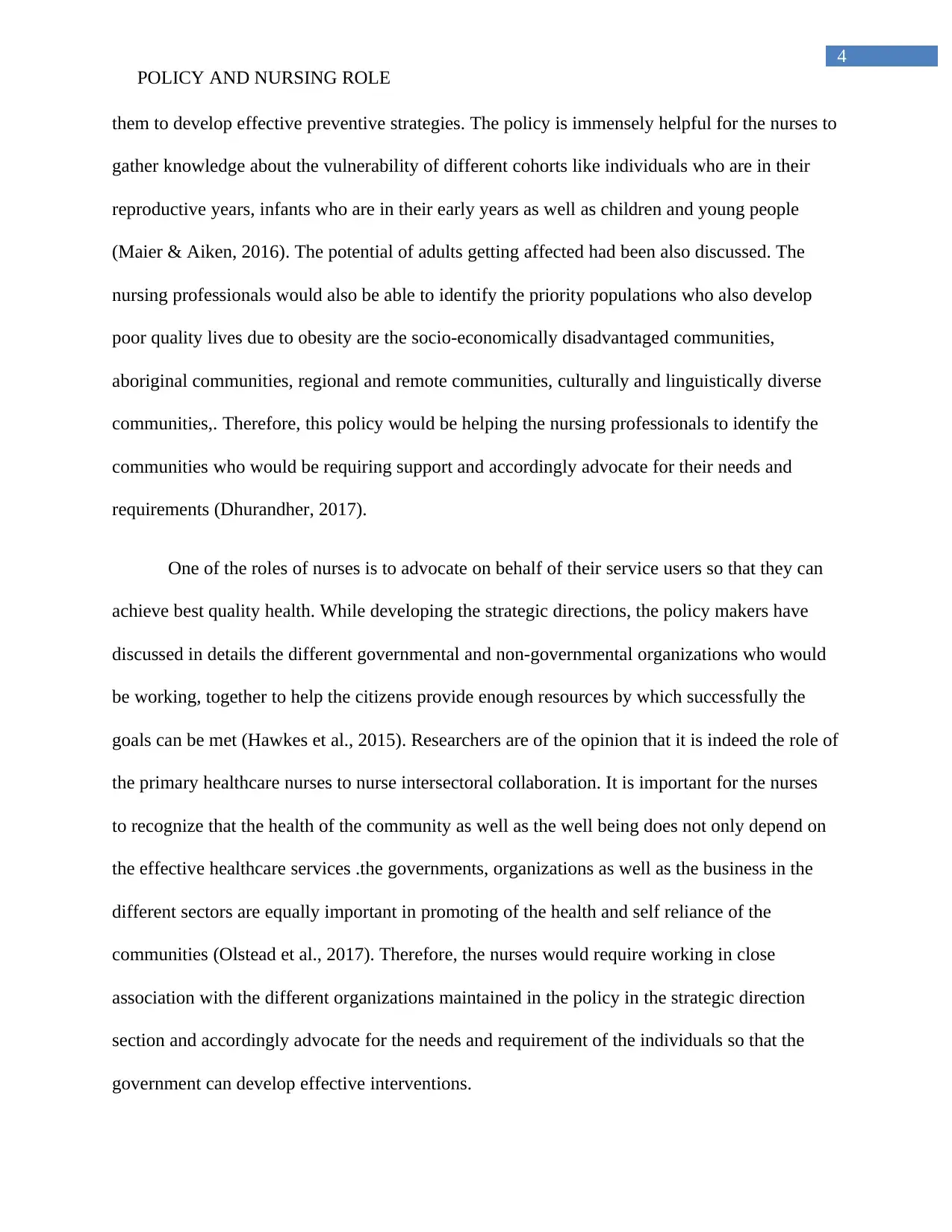
4
POLICY AND NURSING ROLE
them to develop effective preventive strategies. The policy is immensely helpful for the nurses to
gather knowledge about the vulnerability of different cohorts like individuals who are in their
reproductive years, infants who are in their early years as well as children and young people
(Maier & Aiken, 2016). The potential of adults getting affected had been also discussed. The
nursing professionals would also be able to identify the priority populations who also develop
poor quality lives due to obesity are the socio-economically disadvantaged communities,
aboriginal communities, regional and remote communities, culturally and linguistically diverse
communities,. Therefore, this policy would be helping the nursing professionals to identify the
communities who would be requiring support and accordingly advocate for their needs and
requirements (Dhurandher, 2017).
One of the roles of nurses is to advocate on behalf of their service users so that they can
achieve best quality health. While developing the strategic directions, the policy makers have
discussed in details the different governmental and non-governmental organizations who would
be working, together to help the citizens provide enough resources by which successfully the
goals can be met (Hawkes et al., 2015). Researchers are of the opinion that it is indeed the role of
the primary healthcare nurses to nurse intersectoral collaboration. It is important for the nurses
to recognize that the health of the community as well as the well being does not only depend on
the effective healthcare services .the governments, organizations as well as the business in the
different sectors are equally important in promoting of the health and self reliance of the
communities (Olstead et al., 2017). Therefore, the nurses would require working in close
association with the different organizations maintained in the policy in the strategic direction
section and accordingly advocate for the needs and requirement of the individuals so that the
government can develop effective interventions.
POLICY AND NURSING ROLE
them to develop effective preventive strategies. The policy is immensely helpful for the nurses to
gather knowledge about the vulnerability of different cohorts like individuals who are in their
reproductive years, infants who are in their early years as well as children and young people
(Maier & Aiken, 2016). The potential of adults getting affected had been also discussed. The
nursing professionals would also be able to identify the priority populations who also develop
poor quality lives due to obesity are the socio-economically disadvantaged communities,
aboriginal communities, regional and remote communities, culturally and linguistically diverse
communities,. Therefore, this policy would be helping the nursing professionals to identify the
communities who would be requiring support and accordingly advocate for their needs and
requirements (Dhurandher, 2017).
One of the roles of nurses is to advocate on behalf of their service users so that they can
achieve best quality health. While developing the strategic directions, the policy makers have
discussed in details the different governmental and non-governmental organizations who would
be working, together to help the citizens provide enough resources by which successfully the
goals can be met (Hawkes et al., 2015). Researchers are of the opinion that it is indeed the role of
the primary healthcare nurses to nurse intersectoral collaboration. It is important for the nurses
to recognize that the health of the community as well as the well being does not only depend on
the effective healthcare services .the governments, organizations as well as the business in the
different sectors are equally important in promoting of the health and self reliance of the
communities (Olstead et al., 2017). Therefore, the nurses would require working in close
association with the different organizations maintained in the policy in the strategic direction
section and accordingly advocate for the needs and requirement of the individuals so that the
government can develop effective interventions.
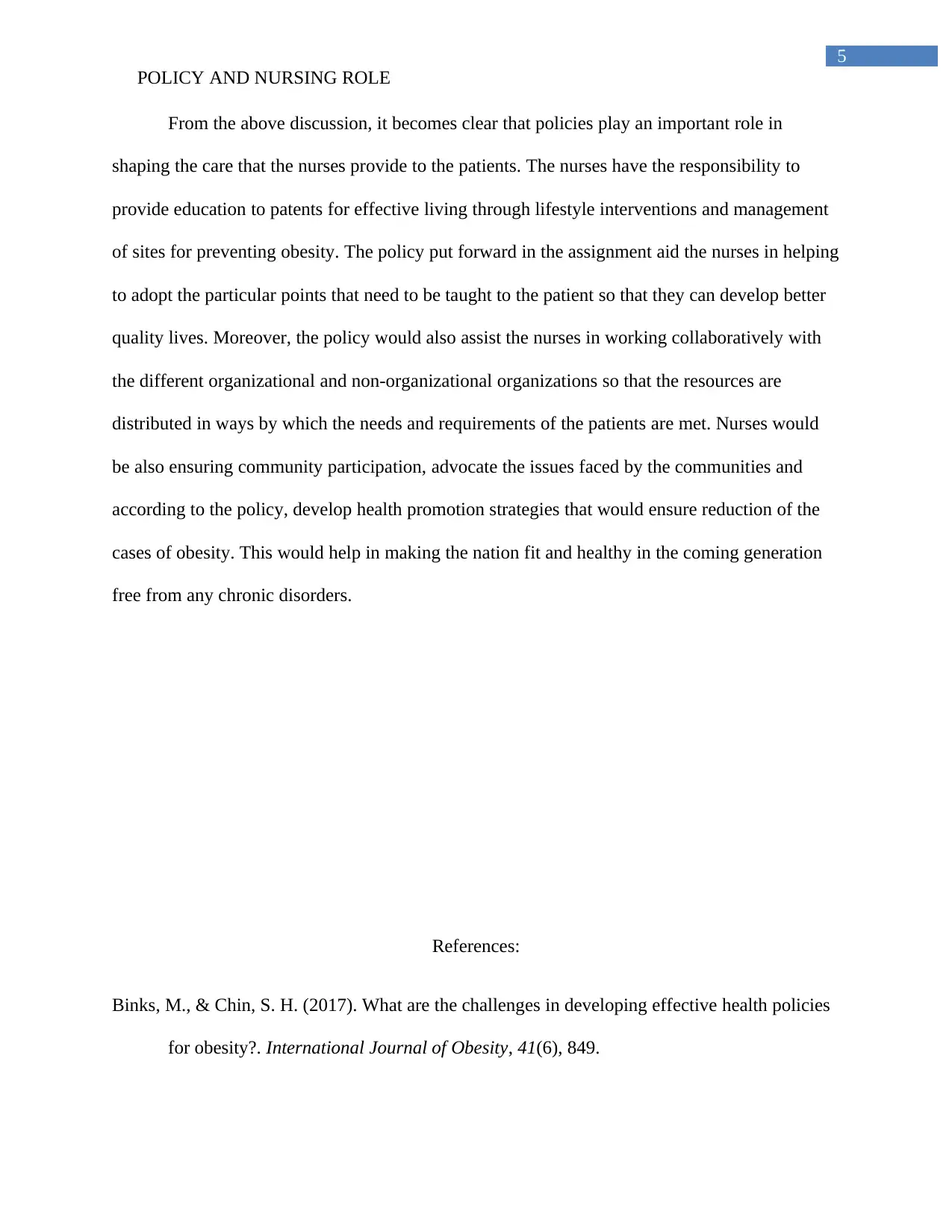
5
POLICY AND NURSING ROLE
From the above discussion, it becomes clear that policies play an important role in
shaping the care that the nurses provide to the patients. The nurses have the responsibility to
provide education to patents for effective living through lifestyle interventions and management
of sites for preventing obesity. The policy put forward in the assignment aid the nurses in helping
to adopt the particular points that need to be taught to the patient so that they can develop better
quality lives. Moreover, the policy would also assist the nurses in working collaboratively with
the different organizational and non-organizational organizations so that the resources are
distributed in ways by which the needs and requirements of the patients are met. Nurses would
be also ensuring community participation, advocate the issues faced by the communities and
according to the policy, develop health promotion strategies that would ensure reduction of the
cases of obesity. This would help in making the nation fit and healthy in the coming generation
free from any chronic disorders.
References:
Binks, M., & Chin, S. H. (2017). What are the challenges in developing effective health policies
for obesity?. International Journal of Obesity, 41(6), 849.
POLICY AND NURSING ROLE
From the above discussion, it becomes clear that policies play an important role in
shaping the care that the nurses provide to the patients. The nurses have the responsibility to
provide education to patents for effective living through lifestyle interventions and management
of sites for preventing obesity. The policy put forward in the assignment aid the nurses in helping
to adopt the particular points that need to be taught to the patient so that they can develop better
quality lives. Moreover, the policy would also assist the nurses in working collaboratively with
the different organizational and non-organizational organizations so that the resources are
distributed in ways by which the needs and requirements of the patients are met. Nurses would
be also ensuring community participation, advocate the issues faced by the communities and
according to the policy, develop health promotion strategies that would ensure reduction of the
cases of obesity. This would help in making the nation fit and healthy in the coming generation
free from any chronic disorders.
References:
Binks, M., & Chin, S. H. (2017). What are the challenges in developing effective health policies
for obesity?. International Journal of Obesity, 41(6), 849.
⊘ This is a preview!⊘
Do you want full access?
Subscribe today to unlock all pages.

Trusted by 1+ million students worldwide
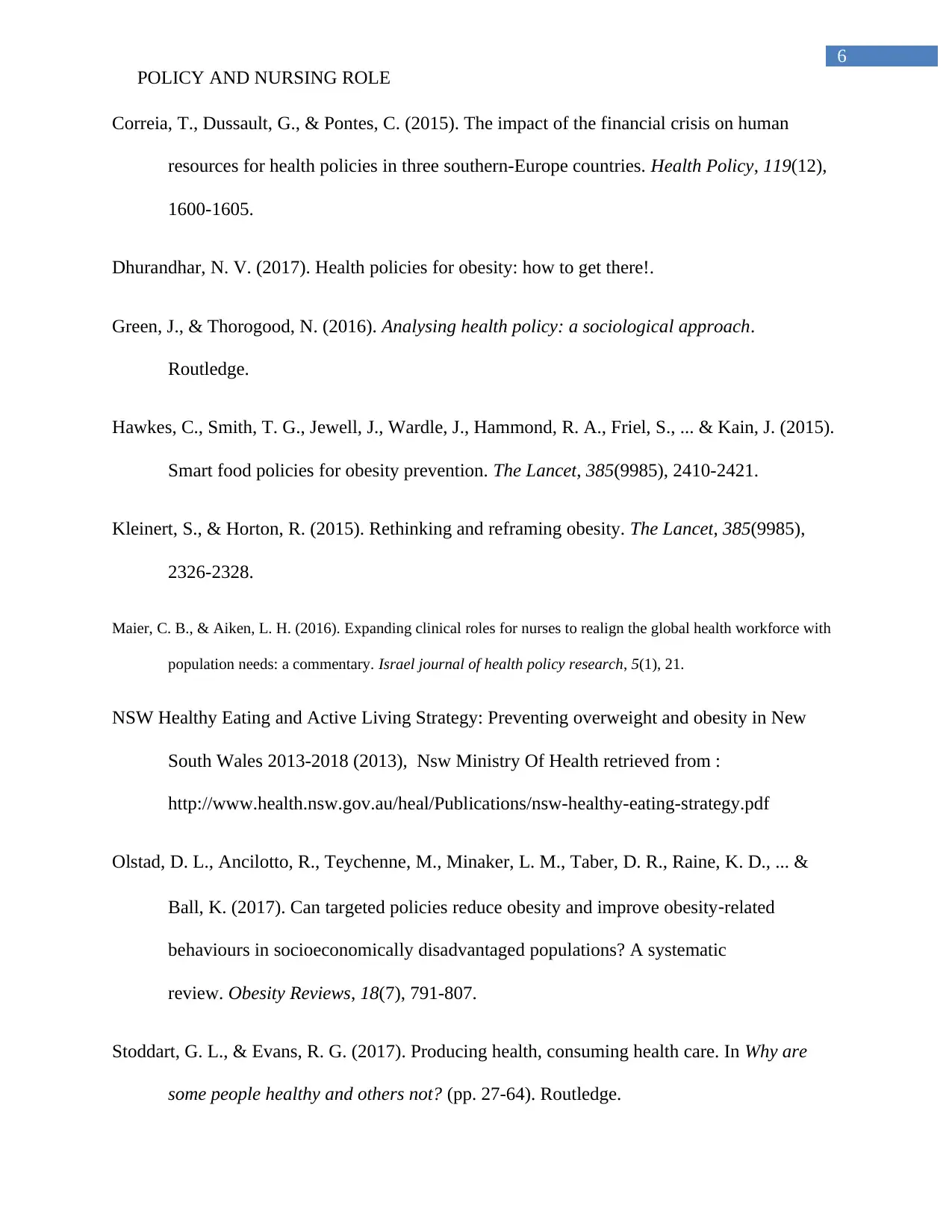
6
POLICY AND NURSING ROLE
Correia, T., Dussault, G., & Pontes, C. (2015). The impact of the financial crisis on human
resources for health policies in three southern-Europe countries. Health Policy, 119(12),
1600-1605.
Dhurandhar, N. V. (2017). Health policies for obesity: how to get there!.
Green, J., & Thorogood, N. (2016). Analysing health policy: a sociological approach.
Routledge.
Hawkes, C., Smith, T. G., Jewell, J., Wardle, J., Hammond, R. A., Friel, S., ... & Kain, J. (2015).
Smart food policies for obesity prevention. The Lancet, 385(9985), 2410-2421.
Kleinert, S., & Horton, R. (2015). Rethinking and reframing obesity. The Lancet, 385(9985),
2326-2328.
Maier, C. B., & Aiken, L. H. (2016). Expanding clinical roles for nurses to realign the global health workforce with
population needs: a commentary. Israel journal of health policy research, 5(1), 21.
NSW Healthy Eating and Active Living Strategy: Preventing overweight and obesity in New
South Wales 2013-2018 (2013), Nsw Ministry Of Health retrieved from :
http://www.health.nsw.gov.au/heal/Publications/nsw-healthy-eating-strategy.pdf
Olstad, D. L., Ancilotto, R., Teychenne, M., Minaker, L. M., Taber, D. R., Raine, K. D., ... &
Ball, K. (2017). Can targeted policies reduce obesity and improve obesity‐related
behaviours in socioeconomically disadvantaged populations? A systematic
review. Obesity Reviews, 18(7), 791-807.
Stoddart, G. L., & Evans, R. G. (2017). Producing health, consuming health care. In Why are
some people healthy and others not? (pp. 27-64). Routledge.
POLICY AND NURSING ROLE
Correia, T., Dussault, G., & Pontes, C. (2015). The impact of the financial crisis on human
resources for health policies in three southern-Europe countries. Health Policy, 119(12),
1600-1605.
Dhurandhar, N. V. (2017). Health policies for obesity: how to get there!.
Green, J., & Thorogood, N. (2016). Analysing health policy: a sociological approach.
Routledge.
Hawkes, C., Smith, T. G., Jewell, J., Wardle, J., Hammond, R. A., Friel, S., ... & Kain, J. (2015).
Smart food policies for obesity prevention. The Lancet, 385(9985), 2410-2421.
Kleinert, S., & Horton, R. (2015). Rethinking and reframing obesity. The Lancet, 385(9985),
2326-2328.
Maier, C. B., & Aiken, L. H. (2016). Expanding clinical roles for nurses to realign the global health workforce with
population needs: a commentary. Israel journal of health policy research, 5(1), 21.
NSW Healthy Eating and Active Living Strategy: Preventing overweight and obesity in New
South Wales 2013-2018 (2013), Nsw Ministry Of Health retrieved from :
http://www.health.nsw.gov.au/heal/Publications/nsw-healthy-eating-strategy.pdf
Olstad, D. L., Ancilotto, R., Teychenne, M., Minaker, L. M., Taber, D. R., Raine, K. D., ... &
Ball, K. (2017). Can targeted policies reduce obesity and improve obesity‐related
behaviours in socioeconomically disadvantaged populations? A systematic
review. Obesity Reviews, 18(7), 791-807.
Stoddart, G. L., & Evans, R. G. (2017). Producing health, consuming health care. In Why are
some people healthy and others not? (pp. 27-64). Routledge.
Paraphrase This Document
Need a fresh take? Get an instant paraphrase of this document with our AI Paraphraser
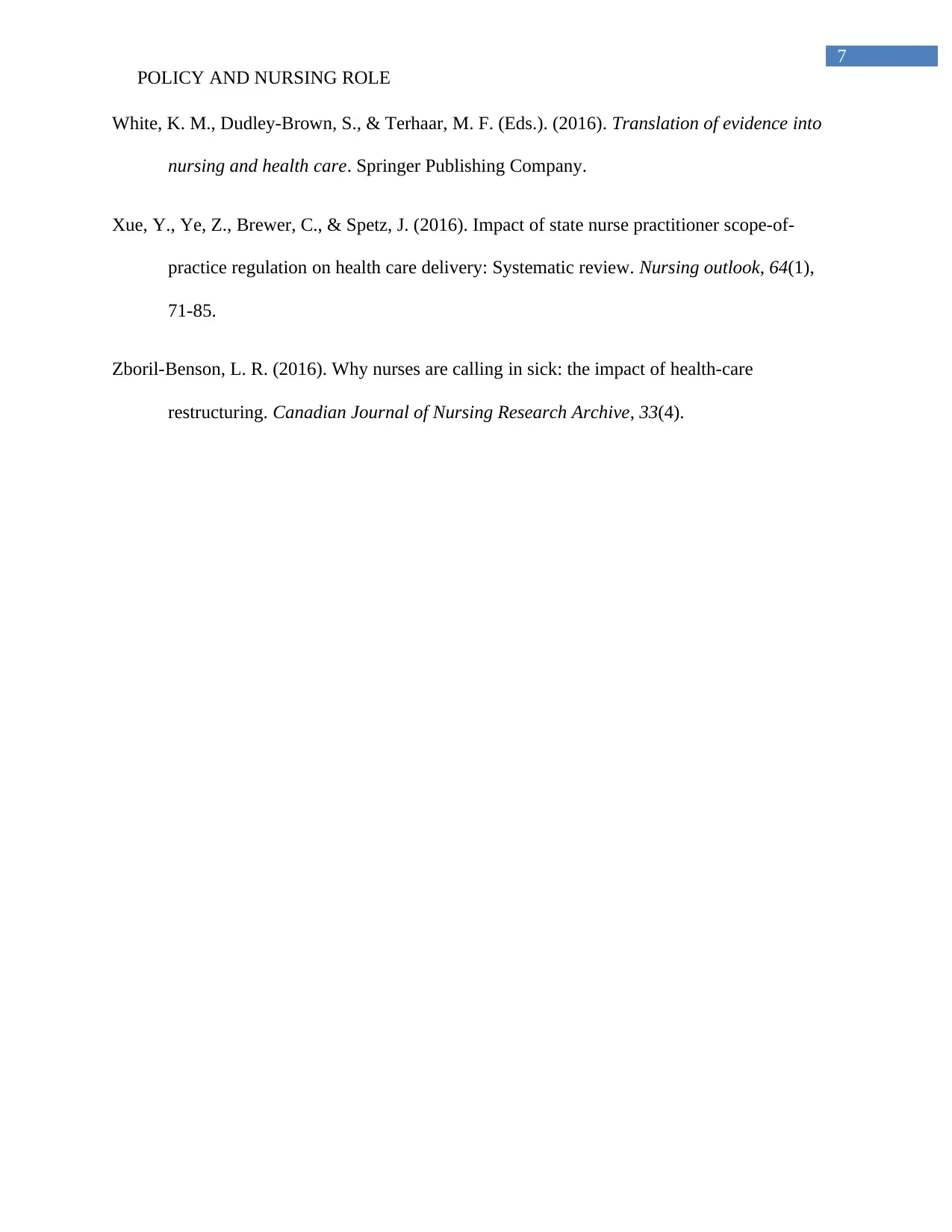
7
POLICY AND NURSING ROLE
White, K. M., Dudley-Brown, S., & Terhaar, M. F. (Eds.). (2016). Translation of evidence into
nursing and health care. Springer Publishing Company.
Xue, Y., Ye, Z., Brewer, C., & Spetz, J. (2016). Impact of state nurse practitioner scope-of-
practice regulation on health care delivery: Systematic review. Nursing outlook, 64(1),
71-85.
Zboril-Benson, L. R. (2016). Why nurses are calling in sick: the impact of health-care
restructuring. Canadian Journal of Nursing Research Archive, 33(4).
POLICY AND NURSING ROLE
White, K. M., Dudley-Brown, S., & Terhaar, M. F. (Eds.). (2016). Translation of evidence into
nursing and health care. Springer Publishing Company.
Xue, Y., Ye, Z., Brewer, C., & Spetz, J. (2016). Impact of state nurse practitioner scope-of-
practice regulation on health care delivery: Systematic review. Nursing outlook, 64(1),
71-85.
Zboril-Benson, L. R. (2016). Why nurses are calling in sick: the impact of health-care
restructuring. Canadian Journal of Nursing Research Archive, 33(4).
1 out of 8
Related Documents
Your All-in-One AI-Powered Toolkit for Academic Success.
+13062052269
info@desklib.com
Available 24*7 on WhatsApp / Email
![[object Object]](/_next/static/media/star-bottom.7253800d.svg)
Unlock your academic potential
Copyright © 2020–2025 A2Z Services. All Rights Reserved. Developed and managed by ZUCOL.




